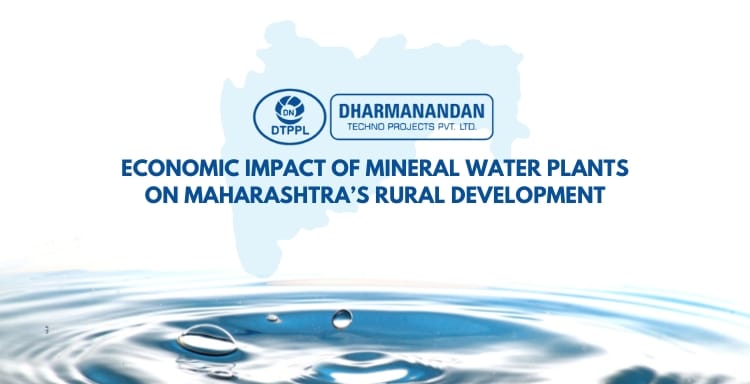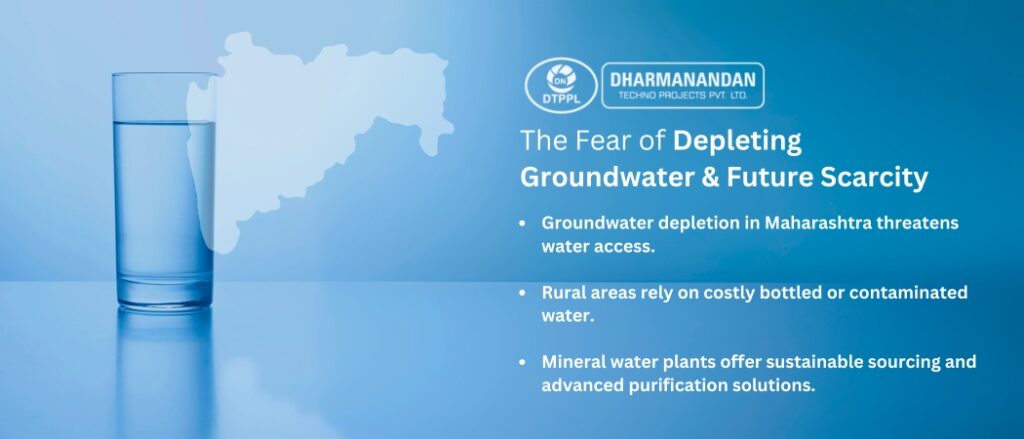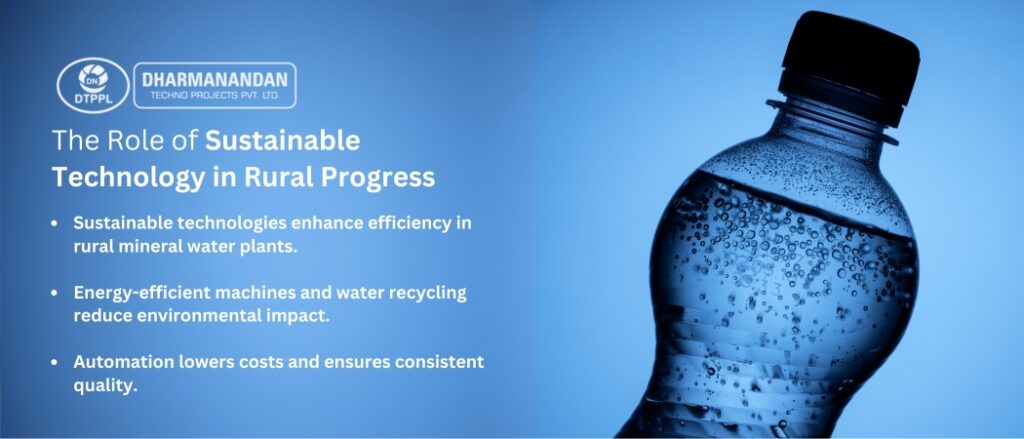
Table of Contents
Economic Impact of Mineral Water Plants on Maharashtra’s Rural Development
January 30, 2025
Maharashtra, the economic powerhouse of India, is often associated with its sprawling urban centers, industrial hubs, and fast-paced development. Cities like Mumbai and Pune showcase modern infrastructure and technological advancements. However, beyond the towering skyscrapers and bustling streets lies another Maharashtra—one where millions struggle with basic necessities, including access to clean drinking water.
The state’s vast rural regions, stretching from the drought-prone Vidarbha belt to the sugarcane-rich fields of Western Maharashtra, face an ongoing crisis of water scarcity and contamination. For decades, unreliable water sources, pollution from agricultural runoff, and depleting groundwater have hindered both public health and economic growth. Mineral water plants have stepped in as a beacon of hope, not just solving water-related issues but also creating employment and business opportunities in these underserved regions.
Let’s explore how these plants are playing a crucial role in transforming rural Maharashtra by tackling water purity challenges and fostering economic development.
The Silent Pain of Rural Water Scarcity in Maharashtra
In many parts of rural Maharashtra, particularly in Marathwada and Vidarbha, water scarcity is a harsh reality. Droughts are frequent, and erratic monsoon patterns make water availability uncertain. Entire villages are often left dependent on government tanker water or distant wells that dry up during peak summer months. Women and children, especially in villages near Beed, Latur, and Nanded, walk miles every day under the blazing sun to fetch water from distant sources.
However, even when water is available, contamination is a major concern. High fluoride levels in groundwater have led to severe cases of dental and skeletal fluorosis, while excessive salinity makes the water unfit for drinking. In some areas, industrial pollution from chemical plants and textile mills has further worsened the situation. Regions near Aurangabad and Solapur have witnessed an alarming rise in cases of waterborne diseases such as typhoid, diarrhea, and kidney disorders.
For villagers, the lack of clean water isn’t just an inconvenience – it directly impacts their livelihoods. Agricultural productivity suffers due to poor-quality irrigation water, while families spend large portions of their income on medical treatments. In such conditions, mineral water manufacturing units have become a critical solution.
Mineral water plants in Maharashtra have provided a reliable alternative to unsafe drinking water. These plants purify contaminated groundwater using advanced filtration and reverse osmosis (RO) systems, ensuring that safe and mineral-enriched water is accessible and affordable for local communities. The introduction of these facilities has drastically improved public health and reduced healthcare expenses for families, making way for a healthier and more economically stable rural Maharashtra.
Click Here to Watch Mineral Water Plant Business IdeasThe Fear of Depleting Groundwater and Future Scarcity
Water scarcity in Maharashtra is not just a seasonal issue, it is a crisis that threatens long-term sustainability. Over the past few decades, unregulated borewell drilling, excessive groundwater extraction for sugarcane farming, and poor water management policies have caused a sharp decline in water tables. Reports suggest that in regions like Jalgaon, Osmanabad, and Ahmednagar, groundwater levels have fallen by over 2-3 meters annually, making it increasingly difficult for villagers to access clean water.
As groundwater sources deplete, rural communities are left with few choices—either depend on expensive bottled water or continue consuming contaminated water, risking their health. In such a scenario, mineral water plants near me have provided a much-needed respite. These plants employ sustainable water sourcing methods and mineral water equipment that maximize purification efficiency while minimizing waste.
For example, many mineral water treatment plants in Maharashtra now incorporate rainwater harvesting systems, helping them source raw water responsibly. Additionally, fully automatic mineral water plants ensure minimal human intervention, reducing operational costs and making clean drinking water more affordable for rural consumers.

The Economic Impact: Job Creation and Rural Entrepreneurship
While mineral water plants primarily aim to provide clean drinking water, their impact on Maharashtra’s rural economy has been equally transformative. These plants have created numerous employment opportunities, providing stable incomes to thousands of villagers who previously had limited job prospects.
- Direct Employment: Many villagers now work as plant operators, quality control analysts, packaging staff, and distribution managers.
- Small Business Growth: Local entrepreneurs have started distributing 20 Ltr Jar Mineral Water, supplying purified water to homes, schools, and offices.
- Retail and Transportation Sectors: The rise of mineral water bottle plants has increased demand for bottling machines, mineral water equipment, and packaging materials, boosting related industries.
A particularly inspiring trend has been the empowerment of women through employment. In many districts, women who previously spent hours fetching water now work in mineral water manufacturing plants, earning a stable income and gaining financial independence. The shift has not only improved household incomes but has also fostered a sense of self-reliance among rural women.
For many small-scale investors, the mineral water business profit margin has made it an attractive venture. However, the cost of setting up a mineral water plant in Maharashtra varies significantly based on factors like automation level, water treatment capacity, and compliance requirements.
- A basic mineral water plant setup may cost anywhere between ₹10-15 lakhs.
- A fully automatic mineral water plant cost could go up to ₹1-2 crore, depending on capacity.
Despite the initial investment, the mineral water business is proving to be a profitable model, offering both financial returns and social impact.

Challenges and the Road Ahead for Maharashtra’s Mineral Water Industry
While the mineral water plant business in Maharashtra is growing, several challenges remain:
- Regulatory Hurdles: Setting up a mineral water plant requires obtaining multiple licenses, including FSSAI certification, BIS approval, and pollution control clearances. Many small entrepreneurs find the mineral water plant license cost and paperwork overwhelming.
- High Operating Costs: Electricity consumption for mineral water machines and water extraction permits can drive up expenses, making it difficult for small businesses to compete.
- Awareness and Accessibility: Despite the increasing presence of mineral water plants, many rural households still rely on untreated groundwater due to lack of awareness or affordability issues.
To tackle these challenges, businesses and policymakers must work together to:
- Promote sustainable water management practices.
- Provide subsidies or financial assistance for small-scale mineral water businesses.
- Expand distribution networks to ensure clean water reaches every village.
By implementing these solutions, Maharashtra can ensure that the mineral water plant business continues to thrive while contributing to both rural economic development and public health improvement.

Be Part of Maharashtra’s Clean Water Movement
The story of mineral water plants in Maharashtra is not just about water purification—it is about economic transformation, rural empowerment, and long-term sustainability. These plants are reshaping lives, bringing clean drinking water to the underserved, and creating employment opportunities that uplift entire communities.
If you’re considering how to start a mineral water plant, now is the time to take action. Partner with trusted mineral water plant suppliers like DTPPL, who provide world-class solutions for setting up an efficient and profitable water plant. Let’s work together to build a healthier, more prosperous Maharashtra.
About Author

Director – Global Marketing and Sales
Mr. Bhavesh from Dharmanandan Techno Projects Pvt. Ltd. has played a pivotal role in elevating the DTPPL brand to the global stage, leveraging his exceptional expertise in marketing and communications. He is committed to helping clients achieve significant growth while strengthening their own brands. Dharmanandan Techno Projects Pvt. Ltd. is a leading manufacturer and supplier of water purification systems and turnkey solutions for mineral water plants. With years of experience in designing and delivering high-quality water treatment solutions, the company provides end-to-end services, including system design, installation, maintenance, and ongoing support. Specializing in scalable and customizable water plants, DTPPL has successfully served industries worldwide, ensuring clean and safe drinking water across diverse applications.




